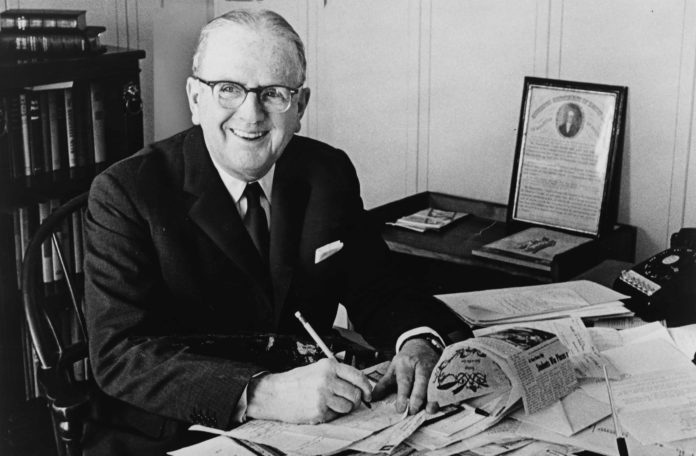|
Audio: Listen to this post | © ClassicBooks.com
|
Norman Vincent Peale was a Methodist minister and writer who grew in popularity due to his insistence on the power of positive thinking. Besides just the podium, he aired much of his thoughts on human living through his book The Power of Positive Thinking. President Ronald Reagan awarded Peale with the Presidential Medal of Freedom due to his immense contributions to the general social development of the United States. His affiliation to the Reformed Church in America saw the Methodist Minister abandon his political ambitions to work towards helping humans taking a more positive perception of life.
Personal life and education
Norman Vincent Peale was born in Bowersville, Ohio on May 31, 1898. He was the firstborn to Charles and Anna Peale. He attended Ohio Wesleyan University after graduating from Bellefontaine High School. At the University, he joined the Fraternity of Phi Gamma Delta after which he proceeded with his education at Boston University School of Theology.
Peale was married to Ruth Stafford Peale. The two, in collaboration with a New York businessman, Raymond Thornburg, opened Guideposts magazine which would be used to share inspirational stories that reflected real-world situations. He also served as the pastor of the Marble Collegiate Church in New York City for 52 years.
Career
Peale was a gifted writer. Based on the quality of his thoughts in the widely read book The Power of Positive Thinking, one can only be mesmerized by his skills. The exciting part is that writing wasn’t his profession. Peale was a psychoanalyst who ran a religious clinic next to the church. The clinic grew rapidly, and by 1951, it had been named the American Foundation of Religion and Psychiatry. Peale served as its president while the founding partner, Smiley Blanton, was the executive director. While Peale took care of religious issues, Blanton was tasked with severe psychiatric cases.
Besides psychiatry and writing, Peale also ran a weekly radio program, The Art of Living. The success of this program can only be attested by the fact that it lasted for a record-setting 54 years. The program ended barely a few years before 1993 when Peale died.
The National Council of Churches sponsored his entry into television when the medium arrived. That helped to put a face to the voice the people had gotten used to hearing through their radios. The message that Peale shared influenced later evangelical leaders like Robert Schuller.
The Art of Living (1937), A Guide to Confident Living (1948), and The Power of Positive Thinking (1952) have continued to increase in popularity. The inclusion of religion in many of his writings makes people attracted to Peale’s books as they seek spiritual nourishment and a source of hope.
Peale was an exemplary person in society, yet his work faced criticisms. Most mental health experts cited his lack of psychiatry background as being unfit to advise on psychological matters. However, the success of his books tells a different story. Being his own best student, he stayed his lane remaining positive in the face of all these criticisms.








